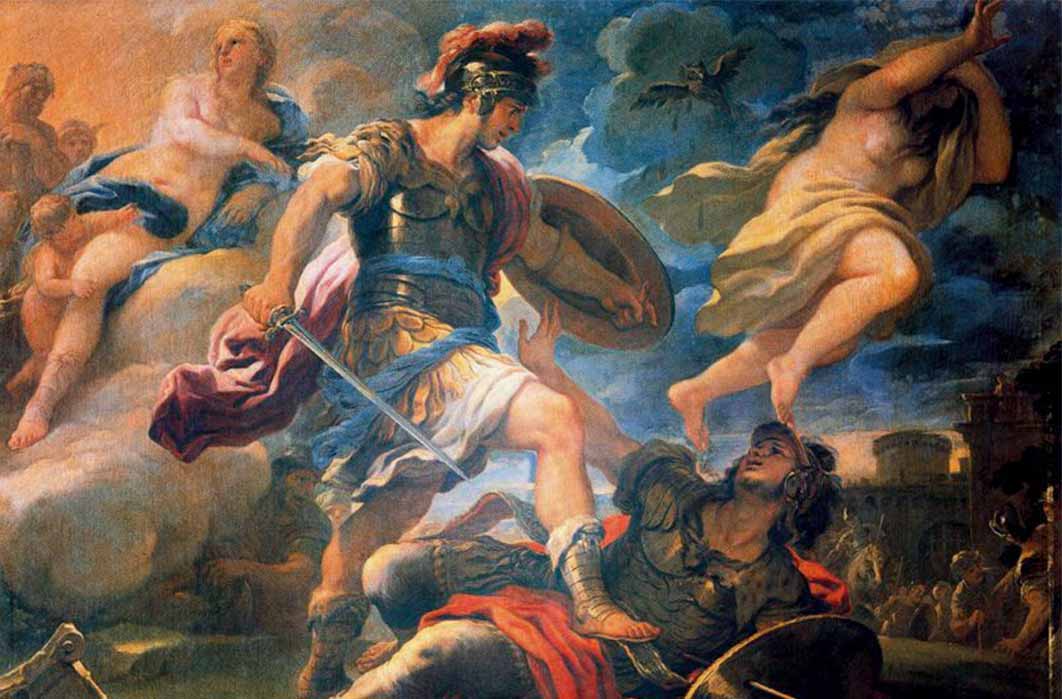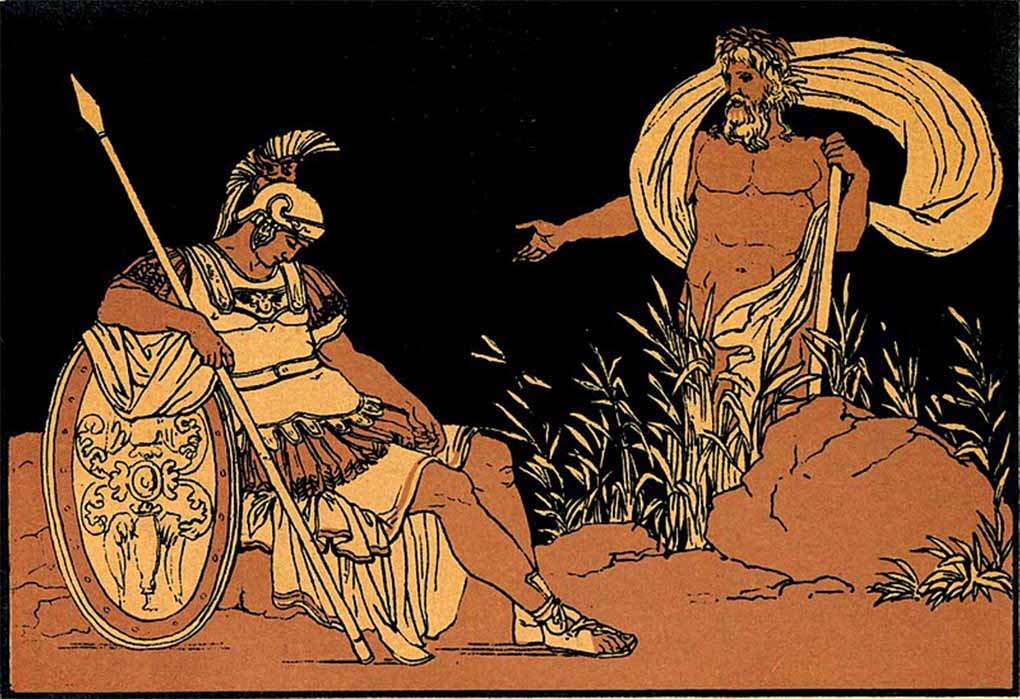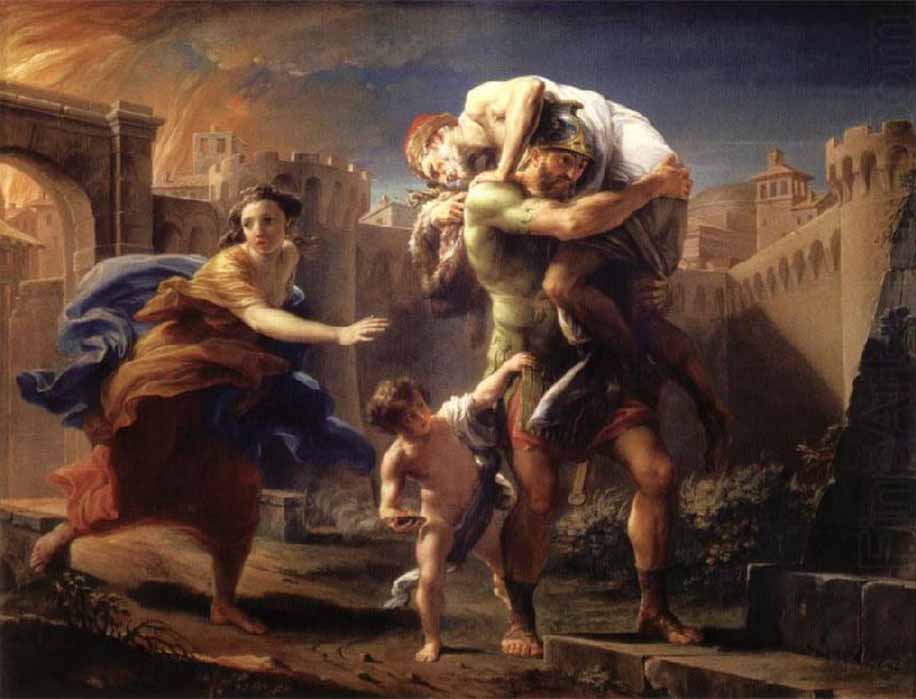
The Prestigious Pedigree Of Aeneas, Descendant Of Dardanos
One hears of Aeneas’ pedigree for the first time from his own mouth, in the Iliad, as he stands facing his arch-foe, Achilles, on the battlefield before Troy: ‘Learn then my lineage if you will – and it is known to many – in the beginning Dardanos was the son of Zeus, and founded Dardania, for Troy was not yet established on the plain for men to dwell in, and her people still abode on the spurs of many-fountained Ida. Dardanos had a son, king Erichthonius, who was wealthiest of all men living; he had three thousand mares that fed by the water-meadows, they and their foals with them… Erichthonius begat Tros, king of the Trojans, and Tros had three noble sons, Ilos, Assaracus, and Ganymede who was comeliest of mortal men; wherefore the gods carried him off to be Zeus’s cupbearer, for his beauty’s sake, that he might dwell among the immortals. Ilos begat Laomedon, and Laomedon begat Tithonus, Priam, Lampus, Clytius, and Hiketaon… But Assaracus was father to Capys, and Capys to Anchises, who was my father.’

Aeneas, legendary ancestor of the Julii, with the god of the Tiber by Bartolomeo Pinelli (pre- 1835) (Public Domain)
This is one of the finest, if not the finest, pedigree in the world. It is one to which numerous dynasties have laid claim, by forging ancestral connections back to Aeneas or Priam. The Caesars did so, and later the kings of France and the Holy Roman Emperors. So, too, did the kings of Dark Age Gwynedd in north Wales, via a purely mythological great grandson of Aeneas, invented for them by their own bards and monks, called Brutus of Troy, and the Tudors later forged a link back to it to benefit from its prestige.
This pedigree, that the Homeric Aeneas, at least, may have learned during his time with Anchises at Palaiskepsis, on the hill of Küçük, linked him back to the very origins of Dardania and placed him in a delicate position that would affect him deeply, in relation to the royal family of Troy.

Aeneas fleeing from Troy, by Pompeo Batoni (c. 1750) (Public Domain)
Creating The Founding Hero Dardanos
Dardanos’ name was invented, like the names of many founding heroes, by Greek etiology. This assumed, incorrectly, that most realms and cities were named after founding heroes. Dardania existed, so there must have been a founding hero called Dardanos. Once the founding hero existed, his story could be embellished with a spouse, siblings and descendants, often all with names derived, etiologically, from local place-names. These lovingly fabricated pedigrees were then brought down to connect with the genuinely remembered ancestors of living rulers.
The founding hero also needed to be given parents. These were often imagined to have been a mortal and a deity, sometimes a mortal man and a goddess, but more often the other way around. All such imagined couplings, which produced the founding heroes of Greece and its neighbours, were collected together in the Catalogue of Women. This is often called the Hesiodic Catalogue, because it tended to be attributed to the earliest known genealogist, Hesiod, but Martin West (1985) who reconstructed much of the Catalogue from surviving fragments and quotes from it by other authors, dated it convincingly to the 500s BC, about 200 years after Hesiod’s time.
- The True Origins of the Legend of Brutus of Troy and the London Stone
- The Voyage of Aeneas of Troy: Did it Really Happen?
- Gods Throwing Dice: Cleromancy In The Trojan War
In the Catalogue, Dardanos gained a mother, Elektra, whom Nonnus, much later, asserted had been Zeus’s secret wife. The Catalogue adds that besides Dardanos, Elektra bore Zeus a son, Iasion, also called Eetion or Iasios, whose fate was to fall in love with his aunt Demeter. The name of Dardania is genuinely ancient. It appears as ‘Drdny’ in an Egyptian text, which lists the Hittites’ allies who checked the advance of Ramesses II at the Battle of Kadesh in 1274 BC, not long, probably, before Aeneas was born. While the hero Dardanos might be a later Greek invention, it is possible that the real Aeneas really was a Dardanian, and that he was told of an ancestor whose name echoed that of his kingdom. If so, perhaps this original Anatolian Dardanos was believed to be the son of the Great Mother, conceived up on Büyük. That idea is perhaps echoed in Servius when he says that, among the places where Dardanos was believed to have been born, were ‘Troy and Ida’.




